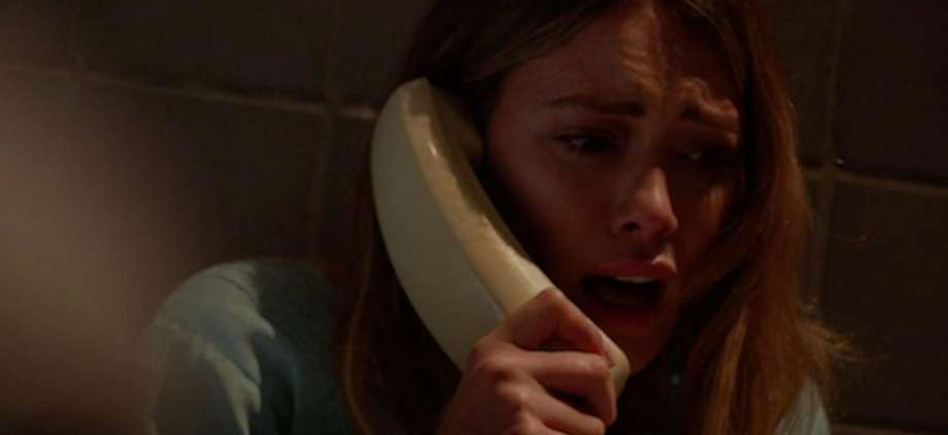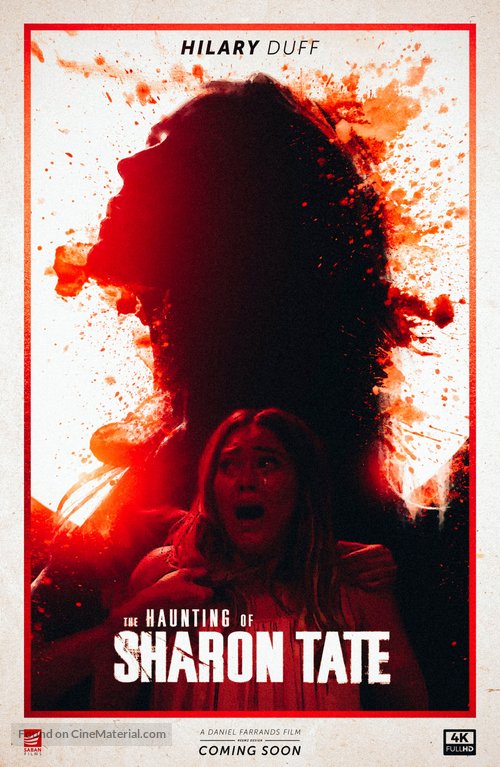This is the second upcoming film that deals with the legacy and influence of Charles Manson and his reign of terror across LA. Anyone would think the 40th anniversary of the notorious Manson murders was coming up, or that one of Hollywood’s coolest directors had a flashy new movie releasing soon that contains that very topic…

You might feel cynical because The Haunting of Sharon Tate appears tailor made to cash in on Tarantino’s upcoming magnum opus about the industry and town that made him just like it destroyed Tate, but don’t dismiss it too quickly.
The entire premise is taken from an interview with the actress a year before her hideous killing. In it she describes visions of psychopaths breaking into her house and butchering her and her friends, supposedly containing accurate details about the way she and the other victims were overpowered and bound.
We see snippets of the interview itself as Tate (Hilary Duff) relates her chilling nightmares but most of the action is in the famed Beverly Hills house in the days leading up to the slayings.
The heavily-pregnant Tate has returned to Los Angeles, her director husband Roman Polanski staying behind in Europe to finish the film he’s working on. Staying in the mansion with her is friend Jay Sebring, Polanski’s friend Wojciech Frykowski and Frykowski’s girlfriend Abigail Folger.
From what appears to be a combination of feeling that her husband has abandoned her when she needs him most, her certainty that he’s cheating on her in Europe, trouble sleeping and a creeping suspicion that Frykowski and Folger are sponging off her, Tate becomes increasingly nervous and skittish. She keeps seeing scenes from the premonition she’s described in the interview, of a man standing in her bedroom in the middle of the night and her friends being hurt and killed, wondering if she’s cracking up or if the universe is trying to tell her she and her unborn child are in danger.
In getting to where the film’s going, writer/director Daniel Farrands proves himself a very effective director of horror (he’s previously directed both The Amityville Murders and a swath of ‘Making Of’ films about classic horror flicks, so he knows the genre conventions). The Cielo Drive house is full of dark shadows and ill-lit corners that are full of foreboding, the soundtrack full of throbs of low menace.
A good example of a creepy horror fixture is the huge cassette deck in the basement studio/office. A song Manson recorded for Terry Melcher, the music producer and former tenant of the house Manson hoped would sign his apocalyptic race war-inciting album, is still on the spools and when it comes on by itself in the middle of the night it’s so scary it feels like Tate’s just realised Fred Krueger or Jason Vorhees is somewhere inside with her.
 It’s also far from a straight biopic of the event. It does depict the killings in incredibly gory and shockingly effective detail, but they play out as a nightmare Tate has just days before the Manson gang actually descend. To reveal what happens on the infamous night of August 8, 1969 would be to spoil one of the central themes of the film but Farrands’ script does something interesting with the facts and history.
It’s also far from a straight biopic of the event. It does depict the killings in incredibly gory and shockingly effective detail, but they play out as a nightmare Tate has just days before the Manson gang actually descend. To reveal what happens on the infamous night of August 8, 1969 would be to spoil one of the central themes of the film but Farrands’ script does something interesting with the facts and history.
There’s a wish fulfilment element that might be an in-story fever dream or might be a comment by the film itself on the way entertainment and pop culture have depicted the tragedy with such macabre glee – maybe including what we expect to see from Tarantino.
A knowledge of the backstory about Manson’s involvement with Terry Melcher and his obsession with The Beatles’ Helter Skelter helps fill in some blanks you might be curious about (including Tate’s freaking out about Manson showing up at the house – he actually did so several times, not knowing Melcher had moved out). But The Haunting of Sharon Tate is ostensibly not about the Manson murders, it’s about exactly what it says in the title – the story of a woman losing her grip because she’s convinced something terrible is going to happen who just happens to be a famous and beautiful actress.
Which brings us to Farrands’ other strength – casting. If you only know Duff from Lizzie Maguire a hundred years ago or her pop music more recently, you won’t be prepared for what she puts into Tate’s crumbling sense of safety and rising sense of panic.
Her accent might seem wobbly across the film but here Duff and Farrands might also be going deeper into character than we realise. Born in Dallas, Tate had as corn-fed an accent as any Texan girl but she worked to lose it for the sake of her career, and when talking about her psychic premonitions to her interviewer in the black and white scenes that bookend the film, Duff is using the subtly fake airs and graces that were popular at the time to make famous actresses appear more European than American to the press.
Rather than the dramatic thriller you expect, The Haunting of Sharon Tate is a full-on horror movie. There’s plenty of blood and scares and as the title suggests, it’s as if a literal ghost is on the prowl. The motifs from the true case – “pig” and “healter skelter” (famously spelled incorrectly) written in blood on the walls – become like Freddy’s bladed glove or Jason’s ski mask. And because the timeline follows its own rules instead of just moving from A to B sequentially, there’s a disturbing early tracking shot that drifts through the house and yard where the victims are sprawled, blood showered everywhere just like the crime scene photos from the actual case.
It’s surprisingly scary, surprisingly well staged and designed, and the story does some unexpected things that adhere to the spirit of the title rather than just tell the story in such a straightforward fashion. Leave that to the other Manson projects sure to emerge, maybe from Tarantino himself.
Let us know what you thought of the chilling The Haunting of Sharon Tate in the comments down below.






